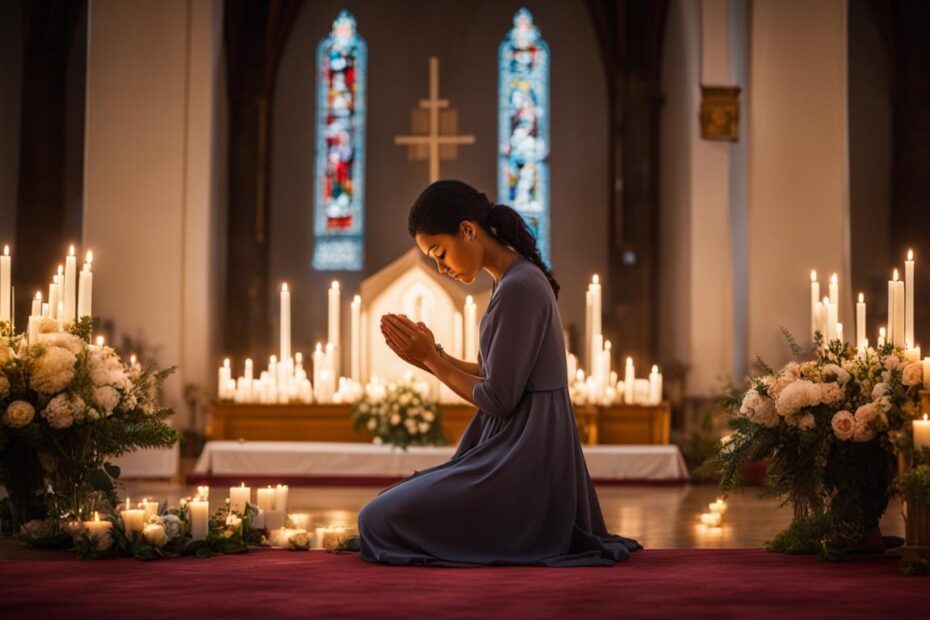The Catholic liturgical prayer is a profound and sacred tradition. One of the essential components of the pre-Mass preparation is the traditional prayer before Mass. This spiritual practice sets the tone for the worship experience and aids in creating a reverent atmosphere. By engaging in this pre-Mass prayer, Catholics embrace the rich heritage of the Church and foster a deeper connection with God.
Key Takeaways:
- The pre-Mass prayer is an integral part of Catholic liturgical prayer.
- It helps to create a reverential atmosphere and prepares individuals for active participation in the Mass.
- Engaging in traditional prayer before Mass fosters a deeper connection with God.
- This practice allows individuals to embrace the rich heritage of the Church and connect with the broader Catholic community.
- By incorporating the pre-Mass prayer into their worship experience, Catholics can enhance their spiritual journey and cultivate a greater sense of holiness.
Importance of the Holy Sacrifice of the Mass
The Holy Sacrifice of the Mass holds immense significance in the Catholic faith, serving as the central act of worship and a vital spiritual practice for believers. It is considered the most perfect form of prayer, representing the unbloody offering of Christ’s sacrifice to God. This sacred liturgical celebration is not only a commemoration of Christ’s sacrifice on the Cross but also a mystical participation in His eternal offering for the salvation of souls.
The Mass is deeply rooted in the traditions of the Church, embodying the essence of Catholic liturgical prayer and worship. It is through the Mass that the faithful encounter the real presence of Jesus Christ in the Eucharist, receiving His Body and Blood for spiritual nourishment and intimate communion with God.
“It would be easier for the world to survive without the sun than to do without Holy Mass,” proclaimed St. Alphonsus Liguori, illustrating the profound importance of this sacred ritual.
The Holy Sacrifice of the Mass is indispensable for the spiritual growth and sanctification of believers. It provides a unique opportunity for individuals to offer praise, gratitude, and supplication to God, drawing closer to Him and deepening their faith. By actively participating in the Mass and receiving the sacraments, Catholics enter into a transformative encounter with Christ, experiencing His abundant grace and mercy.
Furthermore, the Mass transcends time and space, uniting the Church Militant on earth with the Church Triumphant in heaven. It connects the faithful with the rich traditions and prayers of countless generations who have gone before, fostering a sense of unity and continuity within the Catholic community.
To fully appreciate the significance of the Holy Sacrifice of the Mass, one must approach it with reverence, attentiveness, and a willing heart. By embracing traditional Catholic worship practices and immersing oneself in the beauty of the liturgy, believers can deepen their spiritual connection with God, nourish their souls, and grow in holiness.
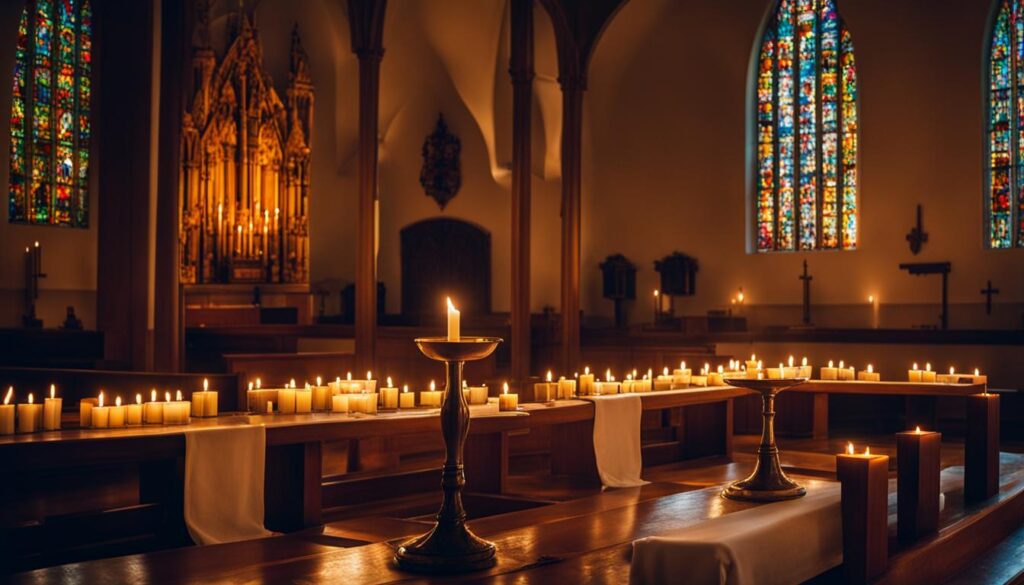
Benefits of the Holy Sacrifice of the Mass:
- Transformational encounter with Christ
- Spiritual nourishment and growth
- Communion with the Church community
- Connection to the traditions of the faith
- Unity with the saints and angels
- Receiving the grace and mercy of God
Wisdom of the Saints on the Holy Sacrifice of the Mass
Various saints have shared their wisdom on the Holy Sacrifice of the Mass, providing valuable insights and guidance for the faithful. Their teachings offer profound inspiration and highlight the significance of this sacred liturgical prayer.
St. Pio of Pietrelcina
St. Pio of Pietrelcina, also known as Padre Pio, encourages approaching Mass with deep devotion. He advises contemplating the Sorrowful Mother at the foot of Calvary, recognizing the immense love and sacrifice of Jesus Christ. Through this devotion, the faithful can enter into a more intimate and transformative encounter with the Divine.
St. Paul VI
In describing the Mass, St. Paul VI proclaims it as the most perfect form of prayer. This sentiment echoes the Church’s teachings on the Eucharist, which emphasizes its central role in the life of a Catholic. The Mass is an extraordinary opportunity for communion with God, where the faithful can offer themselves along with the perfect sacrifice of Christ.
St. Gertrude the Great
St. Gertrude the Great affirms the profound impact of devoutly attending Mass. According to her teachings, for every Mass heard with sincere devotion, a saint is sent by God to provide comfort at the hour of death. This remarkable promise underscores the immense spiritual benefits that flow from participating wholeheartedly in the Holy Sacrifice.
St. Bernard
The teachings of St. Bernard shed light on the merits and importance of actively engaging in Mass. He recognizes the transformative power of the Eucharist, encouraging the faithful to approach this sacred act with reverence, humility, and a profound desire for union with Christ. By doing so, they open themselves to the abundant graces and spiritual nourishment that flow from this sublime sacrament.
St. Peter Julian Eymard
St. Peter Julian Eymard dedicates his life to promoting devotion to the Eucharist and reverent participation in Mass. He emphasizes that the heart of the Christian life lies in the intimate union with Christ through the reception of His Body and Blood. St. Peter Julian Eymard encourages the faithful to approach the Holy Sacrifice with fervor and a deep awareness of the awe-inspiring mystery that unfolds during the Mass.
| Saint | Teachings on the Holy Sacrifice of the Mass |
|---|---|
| St. Pio of Pietrelcina | Approach Mass with devotion and contemplate the Sorrowful Mother at Calvary. |
| St. Paul VI | The Mass is the most perfect form of prayer. |
| St. Gertrude the Great | Each Mass heard with devotion offers comfort from a saint at the hour of death. |
| St. Bernard | Devoutly attend Mass with reverence and desire for union with Christ. |
| St. Peter Julian Eymard | Participate in Mass with fervor and awareness of the Eucharistic mystery. |
These teachings from St. Pio of Pietrelcina, St. Paul VI, St. Gertrude the Great, St. Bernard, and St. Peter Julian Eymard serve as beacons of wisdom, guiding the faithful to approach the Holy Sacrifice of the Mass with deep reverence, devout hearts, and a profound desire for union with the Divine.
Prayer Before Mass by St. Thomas Aquinas
St. Thomas Aquinas, one of the most revered theologians in Catholic history, composed a beautiful prayer that is traditionally recited before Mass. This prayer, known as the Prayer Before Mass, encapsulates a spirit of humble reverence and deep faith.
O merciful God, grant me the healing, purifying, and saving virtues of Your Body and Blood. May I be received into the mystical body of Christ and enter into eternal life with Him. Amen.
The Prayer Before Mass is an acknowledgment of the sacrament of the Lord’s Body and Blood, recognizing its profound significance in the Catholic liturgy. It is a heartfelt plea for healing, purity, and salvation, as well as an expression of the desire to be united with Christ in the mystical body of believers.
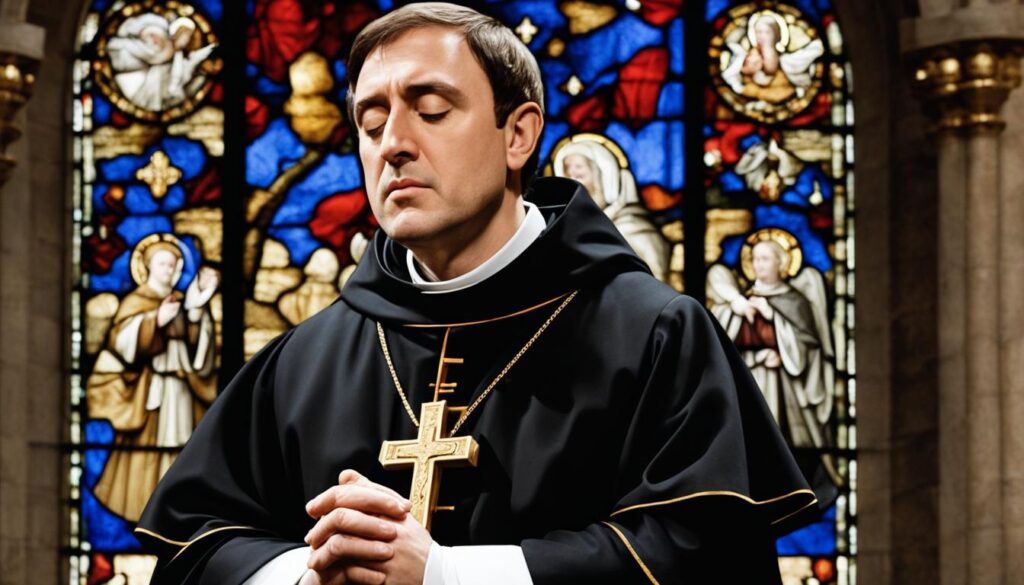
St. Thomas Aquinas understood the transformative power of the Mass and the importance of prayerful preparation. Through the Prayer Before Mass, he invites individuals to approach the Eucharist with humility and reverence, opening themselves to the spiritual nourishment it offers.
This prayer serves as a reminder of the sacredness of the Mass and the profound encounter with Christ that awaits worshippers. It encourages individuals to enter into the liturgy with a receptive heart and a deep desire to be transformed by the grace of God.
Comparison of Pre-Mass Prayers
| Prayer | Author | Key Themes |
|---|---|---|
| Prayer Before Mass | St. Thomas Aquinas | Healing, purity, salvation, desire for unity with Christ |
| Prayer of St. Ambrose | St. Ambrose | Mercy, refuge, acknowledgment of sinfulness |
| Prayer of St. John Chrysostom | St. John Chrysostom | Confession, trust in the mercy of Christ |
The Prayer Before Mass by St. Thomas Aquinas is just one of the many powerful prayers that can deepen the spiritual experience of the faithful before participating in the Mass. These ancient prayers help individuals cultivate a mindset of reverence, humility, and profound communion with God.
By reciting the Prayer Before Mass and other pre-Mass prayers, Catholic believers can prepare their hearts and minds to fully embrace the grace and blessings offered in the Eucharistic celebration.
Prayer After Mass by St. Thomas Aquinas
After partaking in the sacred Eucharist, St. Thomas Aquinas composed a heartfelt prayer that resonates with the gratitude and awe felt by the faithful. This post-Mass prayer serves as a beautiful expression of appreciation to God for the reception of the Precious Body and Blood of Jesus Christ.
With deep reverence and humility, St. Thomas Aquinas implores for forgiveness, purification, and protection against the forces of evil. This poignant prayer seeks unity with the Holy Trinity and reflects the desire to grow closer to God after the transformative experience of the Mass.
“I thank You, O holy Lord, almighty Father, eternal God, who have deigned, not through any merits of mine, but out of the condescension of Your goodness, to satisfy me a sinner, Your unworthy servant, with the precious Body and Blood of Your Son, our Lord Jesus Christ.”
“I implore You, let not this holy communion be to me an increase of guilt unto my punishment, but an availing plea unto pardon and salvation. May it be to me the armor of faith and the shield of a good will. May it purify me from evil passions and cleanse me from every stain; and let it be a refuge to the restless and a comfort to the faint-hearted, that I may be able to stand before You at the day of judgment, with confidence, through Christ our Lord. Amen.”
St. Thomas Aquinas’ post-Mass prayer encapsulates the emotional and spiritual journey that unfolds within each faithful soul after encountering the divine. It serves as a beacon of gratitude and a plea for continued guidance and spiritual fortitude.
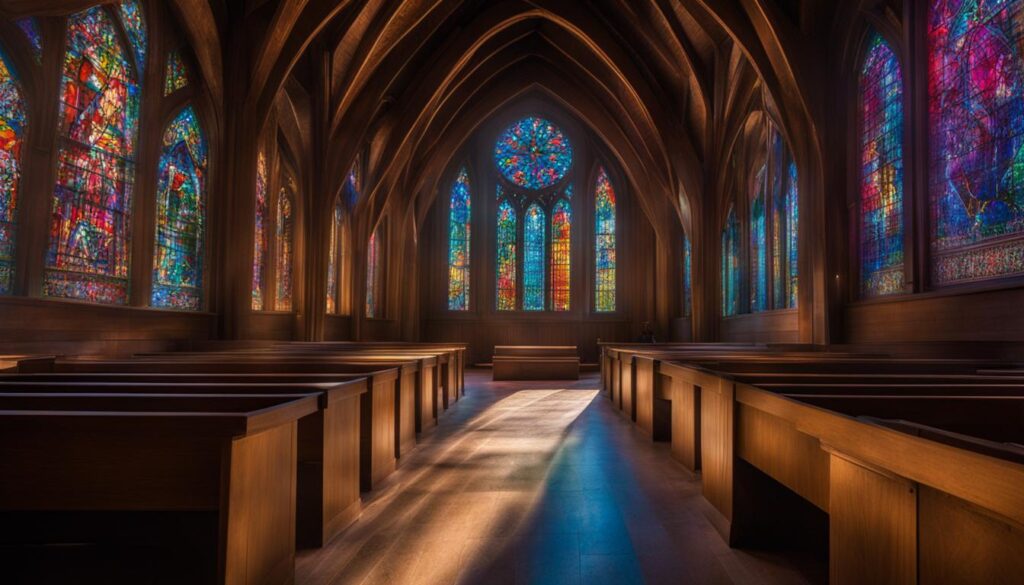
| Benefits of the Prayer After Mass | Keywords |
|---|---|
| 1. Expresses gratitude for the reception of the Precious Body and Blood of Jesus Christ | Precious Body and Blood |
| 2. Seeks forgiveness, purification, and protection against evil | Forgiveness, purification, protection against evil |
| 3. Strives for unity with the Holy Trinity | Unity, Holy Trinity |
| 4. Nurtures a deeper spiritual connection with God | Spiritual connection, God |
| 5. Inspires continued growth in faith and devotion | Growth, faith, devotion |
Prayer of St. Ambrose and St. John Chrysostom Before Mass
St. Ambrose and St. John Chrysostom, esteemed saints of the Catholic Church, composed powerful prayers to be recited before Mass. These prayers serve as a fitting preparation for the sacred liturgy, guiding the faithful in seeking God’s mercy and grace.
The prayer of St. Ambrose focuses on the profound need for God’s mercy and refuge. It acknowledges our own sinfulness and the healing that can only come from the Almighty. In humble recognition of our imperfections, St. Ambrose’s prayer invites us to approach the Mass with contrition and open hearts, ready to receive God’s forgiveness and spiritual nourishment.
O loving Lord Jesus Christ, I, a sinner, seek refuge in Your mercy. I acknowledge my faults and recognize my unworthiness. Grant me healing and forgiveness as I prepare to partake in the Holy Mass. Let Your sacred Body and Blood bring sanctification to my soul and lead me closer to You – the source of all goodness and grace. Amen.
St. John Chrysostom’s prayer before Mass is a beautiful expression of confession and trust in the infinite mercy of Jesus Christ. It acknowledges the unworthiness of the petitioner and places complete reliance on the loving embrace of the Savior. By reciting this prayer, the faithful open their hearts to receive the abundant mercy of Christ, allowing Him to dwell within them and transform their lives.
O Lord, I know my unworthiness and the multitude of my sins. I fear Your judgment and seek Your mercy. Nevertheless, I believe in Your love and compassion, for You offered Yourself as a sacrifice for my salvation. Cleanse me and purify me, O Jesus, and grant me the grace to approach Your Holy Altar with reverence and trust. Amen.

As we meditate on the prayers of St. Ambrose and St. John Chrysostom before Mass, we are reminded of the importance of preparing our hearts and minds for the sacred encounter with Christ. These prayers invite us to reflect on our sins, seek God’s mercy, and place our trust in His infinite love and forgiveness.
Joining our voices with these beloved saints, we enter into the Mass with humility and gratitude, ready to experience the transformative power of Christ’s presence in the Eucharist. Let us embrace the beauty of these pre-Mass prayers and allow them to deepen our spiritual connection with God.
Anima Christi
The Anima Christi is a beautiful Catholic prayer that holds significant meaning, especially when recited after receiving the Eucharist. This prayer serves as a profound expression of surrender and devotion to Christ, encompassing heartfelt sentiments of sanctification, salvation, and protection against evil.
When we recite the Anima Christi, we immerse ourselves in a spiritual dialogue with our Savior, inviting His divine presence to guide and transform our lives. Through this prayer, we acknowledge our dependence on Christ’s mercy and grace, placing our trust in His love and redemptive power.
Soul of Christ, sanctify me.
Body of Christ, save me.
Blood of Christ, inebriate me.
Water from the side of Christ, wash me.
Passion of Christ, strengthen me.
O Good Jesus, hear me.
Within Your wounds hide me.
Permit me not to be separated from You.
From the evil one, protect me.
At the hour of my death, call me.
And bid me to come to You,
That with Your saints I may praise You
Forever and ever. Amen.
The Anima Christi encapsulates our longing for spiritual purification, our desire to be united with Christ, and our hope for eternal communion with Him. It reminds us of the transformative power of the Eucharist and the profound impact it has on our journey of faith.
As we utter these heartfelt words, let us embrace the sacredness of the post-Mass prayer and allow its profound meaning to resonate within our souls. Through the Anima Christi, we reaffirm our commitment to follow Christ, seeking His guidance, protection, and grace as we strive to live a life rooted in love, faith, and holiness.
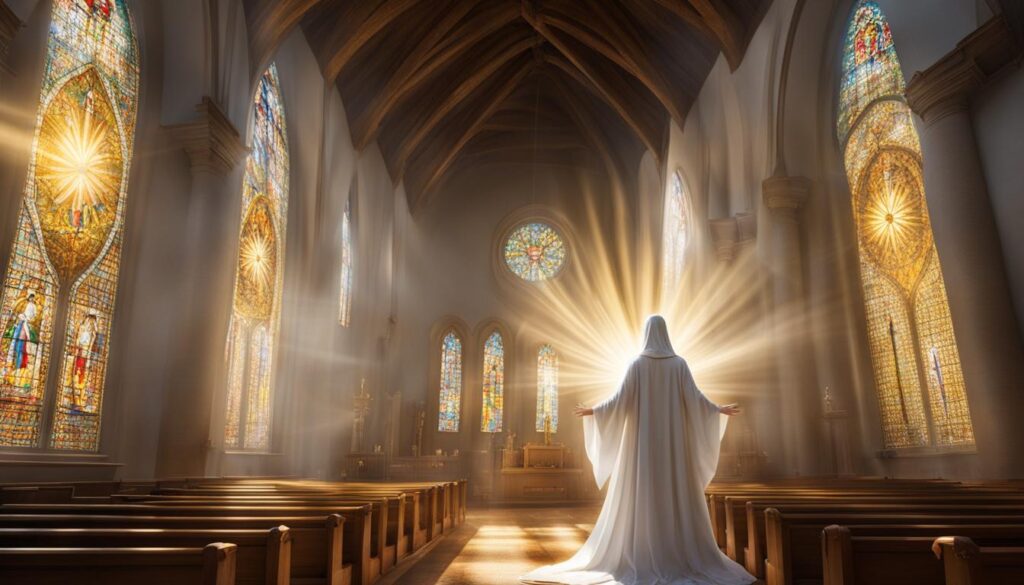
Benefits and Spiritual Nourishment of Traditional Prayer Before Mass
Engaging in traditional prayer before Mass offers numerous benefits and spiritual nourishment. It is a time-honored practice that helps individuals recollect themselves and prepare for prayerful participation in the Mass. By engaging in traditional liturgical practices, individuals can foster a deeper connection with the sacred liturgy and cultivate a sense of reverence.
Prayer before Mass plays a crucial role in spiritual preparation for the Mass. It allows individuals to enter into a state of spiritual readiness, setting the stage for a meaningful worship experience. Taking the time to engage in traditional prayers helps to quiet the mind, center the heart, and create a sacred space within oneself.
Through traditional prayer, individuals can develop a deeper relationship with God. It provides an opportunity for introspection, self-reflection, and surrendering to the divine presence. By embracing these timeless practices, individuals can open themselves up to receive the graces and blessings that the Mass offers.
Moreover, traditional prayer before Mass enhances the overall worship experience. It fosters a deeper understanding and appreciation for the liturgy, allowing individuals to actively participate in the sacred ritual. By immersing oneself in the richness of traditional liturgical practices, individuals can cultivate a deeper sense of reverence and awe for the Eucharistic celebration.
As St. Augustine once said, “He who sings prays twice.” Traditional prayers often include sacred music and hymns, which elevate the soul and create a harmonious atmosphere. The combination of heartfelt prayer and sacred music can enhance the spiritual experience and foster a profound sense of union with God and the worshiping community.
“Traditional prayer before Mass offers a sacred space for individuals to prepare themselves spiritually. It sets the tone for the Mass and fosters a deeper connection with the liturgy. By engaging in these timeless practices, individuals can cultivate a more meaningful and transformative worship experience.”
Ultimately, engaging in traditional prayer before Mass is a transformative experience. It allows individuals to enter into a sacred space within themselves, preparing them to encounter the divine presence in the Mass. By embracing traditional liturgical practices, individuals can embark on a spiritual journey that nourishes the soul and deepens their relationship with God.
Incorporating Ancient Prayers into the Mass
Many parishes and individuals choose to honor tradition and connect with the roots of the Catholic Church by incorporating ancient prayers into the Mass. These prayers, steeped in history and reverence, offer a profound way to deepen the worship experience and foster a sense of sacredness.
Sacramental rituals and religious traditions hold great significance in Catholic liturgical worship. By including ancient prayers before or after the Mass, individuals can immerse themselves in the rich spiritual heritage of the Church.
These prayers, passed down through generations, serve as a bridge to the past, linking the faithful to the devotion and piety of those who came before. They evoke a sense of continuity and unity with the larger body of believers while inviting a deeper connection to God.
“When you pray, you are not alone. You stand with the entire Church, both the living and the departed, united in the worship of God.”
By reciting ancient prayers before Mass, participants engage in a spiritual preparation that helps them refocus their minds and hearts on the sacredness of the liturgy to come. These prayers create a sacred atmosphere, allowing worshippers to enter into a state of reverence and humility, opening themselves to God’s presence.
Furthermore, incorporating ancient prayers into the Mass can deepen the understanding of the historical context and theological significance of Catholic rituals. This enriches the worship experience by bringing to light the profound symbolism and meaning behind every action and word spoken during the liturgy.
The beauty of ancient prayers lies in their timeless relevance and ability to draw worshippers closer to their faith. They remind us of the enduring nature of our beliefs and the unending grace and mercy of God.
Sample Table:
| Prayer | Origin |
|---|---|
| Anima Christi | Attributed to St. Ignatius of Loyola |
| Prayer Before Mass by St. Thomas Aquinas | Composed by St. Thomas Aquinas |
| Prayer of St. Ambrose | Composed by St. Ambrose of Milan |
| Prayer of St. John Chrysostom | Composed by St. John Chrysostom |
These are just a few examples of the ancient prayers that can be seamlessly woven into the fabric of the Mass, offering a profound spiritual experience for all who participate.
As the words of these ancient prayers resound within the sacred space, the faithful are transported beyond the confines of time, standing in unity with all those who have worshipped before them. Through the incorporation of these prayers, the Mass becomes a truly transcendent experience, illuminating the beauty and depth of the Catholic faith.
Conclusion
Traditional prayer before Mass is essential for establishing a profound spiritual connection and fostering liturgical reverence. By engaging in these ancient practices, individuals can prepare themselves spiritually and enter into the sacred ritual with a heightened sense of devotion and reverence.
Through traditional prayers, such as those composed by St. Thomas Aquinas, St. Ambrose, and St. John Chrysostom, worshippers can express their humility, seek forgiveness, and acknowledge their need for healing. These prayers act as a gateway to a deeper understanding of the Mass and the sacramental grace it offers.
Embracing the customs and traditions associated with the Mass enables individuals to unlock a transformative worship experience. As they open their hearts to these ancient prayers, they intertwine their lives with the collective faith of generations past. This communion with the Church’s rich history deepens their own personal journey of faith and solidifies their commitment to the teachings of the Catholic Church.
Incorporating traditional prayer before Mass empowers individuals to embark on a spiritual journey, cultivating a profound connection with God and creating an atmosphere of reverence within their hearts. Whether reciting the Anima Christi or uttering the prayers of St. Thomas Aquinas, these moments of reflection and dedication set the stage for an intimate encounter with the divine.
FAQ
What is traditional prayer before Mass?
Traditional prayer before Mass refers to the ancient prayers and rituals performed by Catholics to prepare for the worship service.
Why is the Holy Sacrifice of the Mass important in the Catholic faith?
The Holy Sacrifice of the Mass is considered the most perfect form of prayer and is necessary for the salvation of souls.
What did the saints say about the Holy Sacrifice of the Mass?
The saints emphasized the significance of the Mass, with statements highlighting its importance and the need for devout participation.
What was St. Thomas Aquinas’ prayer before Mass?
St. Thomas Aquinas composed a prayer of humble reverence and faith, asking for healing, purity, and salvation before Mass.
What was St. Thomas Aquinas’ prayer after Mass?
St. Thomas Aquinas composed a prayer expressing gratitude to God for the reception of the Precious Body and Blood of Jesus Christ.
What were the prayers of St. Ambrose and St. John Chrysostom before Mass?
St. Ambrose’s prayer seeks mercy and refuge from God, acknowledging sinfulness, while St. John Chrysostom’s prayer confesses sins and trusts in the mercy of Jesus Christ.
What is the Anima Christi prayer?
The Anima Christi is a prayer of surrender and devotion to Christ, often recited after receiving the Eucharist, asking for sanctification, salvation, and protection against evil.
What are the benefits of traditional prayer before Mass?
Traditional prayer before Mass helps individuals recollect themselves, prepare for prayerful participation, foster a deeper connection with the liturgy, and cultivate a sense of reverence.
How can ancient prayers be incorporated into the Mass?
Many parishes and individuals choose to recite ancient prayers before or after the Mass, honoring tradition and adding a sense of sacredness and continuity to the worship experience.
What is the significance of traditional prayer before Mass?
Traditional prayer before Mass is a powerful tool for fostering a deeper spiritual connection, cultivating liturgical reverence, and enhancing the worship experience.


